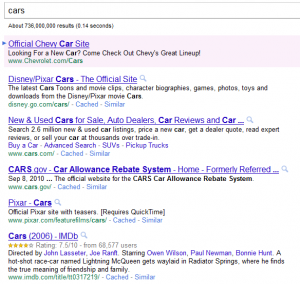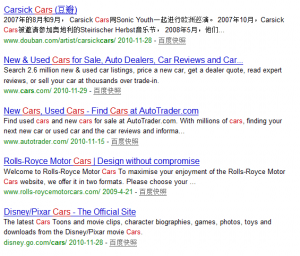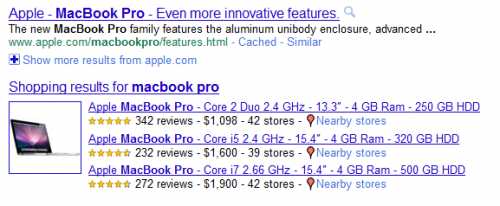The Incredible Stupidity Of Investigating Google For Acting Like A Search Engine
I did a search at Google today for “cars” and was shocked. Rather than list links allowing me to search for “cars” on Bing, Yahoo, Baidu, Voila, Naver and Yandex, Google instead favored its own search results. I’m glad the EU will be investigating whether this favoritism violates anti-trust laws. Consider the evidence. Here’s a […]
I did a search at Google today for “cars” and was shocked. Rather than list links allowing me to search for “cars” on Bing, Yahoo, Baidu, Voila, Naver and Yandex, Google instead favored its own search results. I’m glad the EU will be investigating whether this favoritism violates anti-trust laws.
Consider the evidence. Here’s a search on Google for cars:
As you can clearly see, none of the competing search engines I’ve named are listed in the top results. Rather than show them, Google instead shows pages about cars that it has collected across the web using its own technology.
Google’s behavior like this is preventing its competitors from receiving valuable traffic, clearly something Google has done to ensure it remains dominant. I mean, consider that you can indeed search at Bing and find results for cars:
Or you can search on Baidu and get results for cars:
But a search for “cars” at Google reveals none of this, to the searcher. It sends them directly to sites about cars! By doing so, rather than sending searchers to other search engines, Google abuses its dominant market position to prevent competing search engines from doing well.
How “Unbiased” Google Should Appear
How might “unbiased” search results at Google look, if we could finally get some decent “search neutrality” laws. I’ll simulate this for a search on “cars” not with an illustrated mockup but instead actual links that you can click on, so you can experience the better experience searchers would have, if Google wouldn’t favor itself. Here’s my interactive demo:
You searched for “cars”
About 6 results (0.08 seconds)
bing.com/search?q=cars
search.yahoo.com/search?p=cars
www.baidu.com/s?wd=cars
Yandex: has found 31 million answers
yandex.com/yandsearch?text=cars&lr=200
search.naver.com/search.naver?query=cars
search.ke.voila.fr/S/voila?rtype=kw&bhv=web_fr&profil=voila&rdata=cars
Please try the demo about to understand directly how much better Google would be as a search engine, if rather than favoring its “own” results, it instead made you leave to conduct your search elsewhere.
Enough Sarcasm
Time to get serious. I’ve watched the various arguments from some vertical search engines that Google is somehow “favoring” its own vertical search engine to harm them. On the face of it, it’s easy to get worked up and decide there’s some wrong doing.
Google points you to its own shopping search rather than a competing shopping search engine! Google even puts a box right within its own search results to entice you there, as you can see in this search for macbook pro:
How unfair to other shopping search engines. Please, someone, some government body, step in and prevent this from happening! Please ensure that Google doesn’t favor its own services this way!
Some Common Sense & Logic
If you step back from the rhetoric, the political jockeying, the concerns that Google is just too big so let’s use any argument to stop it — if you logically think about this argument from a user perspective — it makes no sense.
Google is a search engine. A search engine’s job is to point you to destination sites that have the information you are seeking, not to send you to other search engines. Getting upset that Google doesn’t point to other search engines is like getting upset that the New York Times doesn’t simply have headlines followed by a single paragraph of text that says “read about this story in the Wall Street Journal.”
It’s insane. It really is. A person comes to Google for answers. Back in the “old” days when search engines were just getting started, that generally meant simply getting lists of web pages (though even back then, even before Google, search engines also had some vertical search engines).
Over time, it has made more sense for search engines like Google — or Bing for that matter — to provide a better search experience by creating vertical search engines and blending them into regular search results (see Search 3.0: The Blended & Vertical Search Revolution for more about this).
It’s their job. If they are not allowed to do this, they cannot serve their users well. They are ultimately forced to do the idiotic thing I illustrated above and say to searchers, “Go away and search elsewhere.”
Let’s go back to that shopping search. Exactly how is Google favoring itself, again? It has a dedicated shopping search engine that lists external sites, destination sites — sites that are not on Google, for the most part. While some small shopping search engines may wish they had this traffic, they’d get it at the expense of these destination sites.
EU Investigating Google
Back to that European Union investigation. The news about it came out today, and the EU statement says it will investigate allegations in both Google’s editorial and paid results. The statement stresses that it’s just an investigation, not a conclusion:
This initiation of proceedings does not imply that the Commission has proof of any infringements. It only signifies that the Commission will conduct an in-depth investigation of the case as a matter of priority.
For one long account of Foundem’s side of things, a UK-based shopping search engine that’s become a cause célèbre around this issue and which helped prompt the investigation, I recommend reading this story from The Register.
Search Engines = Newspapers
Certainly on the advertising front, both the EU and the US have supported more restrictions about what a publication can do versus its editorial content. Google ultimately is a publication, a guide to the web. Like a newspaper, it can publish whatever it wants. That’s been supported in the US; we’ll see if the EU takes a different view. More important, we’ll see if the EU decides to apply rules about what a search engine can or can’t do versus what Google can or can’t do.
Bing, Google’s chief competitor in many countries, highly touts its own vertical search engines. If it’s unfair for Google, as a search engine, to “favor” its own vertical search engines, then the same should be true for all search engines.
Also see my prior post on this topic, The New York Times Algorithm & Why It Needs Government Regulation. It takes the poor wisdom of an New York Times editorial suggesting that Google needs regulation and flips things around to illustrate how newspaper-like search engines are — and how no newspaper would want to be examined this way. It also touches on things that can be concerning about Google. Goodness knows, it’s not perfect.
But on the vertical search engine front, where does it end? Shopping search not allowed, but not image search? News search but no blog search? Only web search? Even that? Will Google be deemed so dominant that the only way to ensure competition is to literally force it to send people away to competitors?
Postscript: Google now has a blog post up about the issues.
Contributing authors are invited to create content for Search Engine Land and are chosen for their expertise and contribution to the search community. Our contributors work under the oversight of the editorial staff and contributions are checked for quality and relevance to our readers. The opinions they express are their own.
Related stories
New on Search Engine Land



